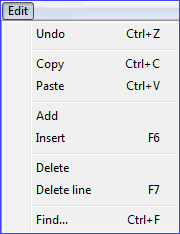

Define formula for use with Products, Drawings etc.
The formulae table stores all the formulae used in products, parts, machining ... Each formula has a name and the table contains the formula details and notes. At the main screen:-
● Select: Libraries - Formulae table

Whilst formulae can be entered directly in the product or part libraries it is better especially if using long or complex formulae when building up product details or the same formula is used in several different products it is easy to make a mistake when re-entering the formula or there may not be enough space to enter other items. To avoid these problems build up a table of formulae which can be used in any product definition or part drawing.
- On each line enter a formula name, formula description, and the formula itself. Each formula name must be unique
![]() Save (the table is
saved to a database/library)
Save (the table is
saved to a database/library)
![]() New
(also Return on the last line to create a
new line)
New
(also Return on the last line to create a
new line)
![]() Delete (move to a line and
select Delete)
Delete (move to a line and
select Delete)
![]() Print ('Print setup' and
'Print preview' are on the 'File' menu
Print ('Print setup' and
'Print preview' are on the 'File' menu
![]() Help
Help
![]() Exit
Exit
These options are also on the menus and on the 'Edit' menu are the usual 'Cut, Copy, Paste' options); 'Find' to locate an item; 'Insert line' to add a line between other lines.

Using formulae from the table
Once a formula is defined it can be used in part drawings, product library and in any place where formulae are allowed.
When entering formulae from the table in the product library or part drawings - identify the formula with the character &. For example: &DOORPOSITION&
When entering formulae in the product library or in part library use the list box (or F2) to display a list of formulae and select the formula required.
Information boxes and Formula names
The name of a formula (from the formulae table) can be used in the information boxes in the part library. There can be only 1 formula name per information box and the formula name is enclosed with the & symbol (the = symbol is not entered), for example:-
&testformula&
Fx - use this to select a formula
Notes
Formulae and lookups
Lookups can be used for numeric values as part of a formulae, for example:-
=$MATTHK$*10
Evaluates to 180 if the $MATTHK$ was 18
- Lookups used in formulae should be defined so that they return a numeric value. If a lookup does not return a numeric value, no error will be reported, but unpredictable results may occur.